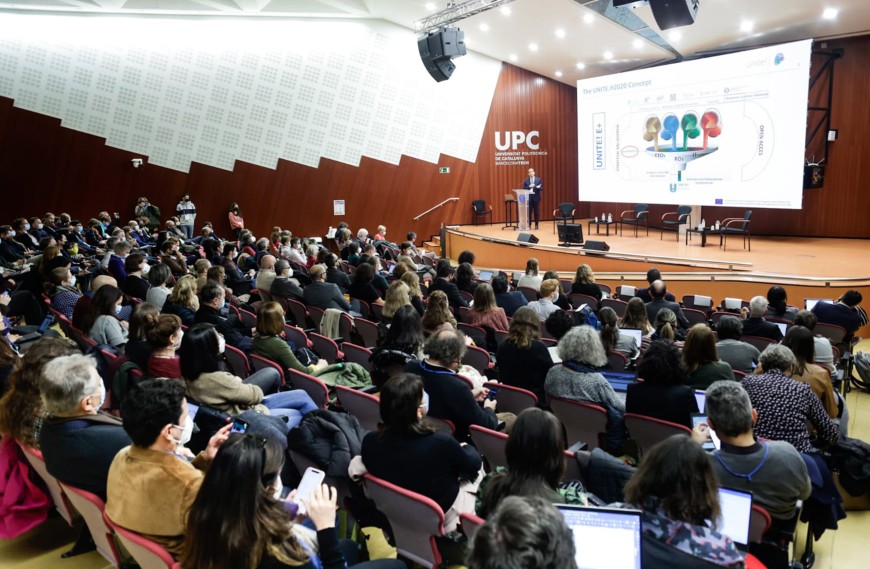Unite! on the way to the future
Review of the 4th Dialogue in Barcelona
2021/12/15
Starting on November 29, the Universitat Politècnica de Catalunya (UPC) welcomed members of the university alliance Unite! to the 4th Unite! Dialogue, as well as representatives of various stakeholders, for the first Branding Event in Barcelona to pave the way for Unite! in the future.

The 4th Unite! Dialogue once again opened up to the public and allowed different stakeholders to meet at the first Unite! Branding Event to give the different stakeholders a chance to have their say. Together with the Unite! community, speakers from business, industry, politics and civil society debated five key topics: ethics and technology, impact on the European Higher Education Area, impact on regional innovation ecosystems, leadership on smart technologies and global impact on society. The common goal: to address current challenges for a new future.
Voices on Unite!
UPC Rector Daniel Crespo stated that “Europe in itself is a wonderful project. Its main objective is to create European citizens and Higher Education is the most useful tool we have to achieve it”. Speakers discussed the necessary involvement of governments in promoting the joint projects prepared by the alliances. Juan Rayón, President of the Erasmus Student Network, stated that “the European University Initiative is a soft policy plan, so for Unite! to become a reality, we need the ambition of the heads of state because it is really about European cooperation”. José Manuel Pingarrón, Secretary General of State of the Spanish Ministry of Universities, encouraged universities “to believe in this alliance and to go ahead with it”. Pingarrón said that “you have the support of the Spanish government and our role is to remove the barriers to make it a reality”. In this sense, Gerard Vives, director general of European Affairs and Institutional Representation Abroad of the Department of Foreign Affairs of the Generalitat of Catalonia, said that Unite! “is really the right initiative at the right time. I'm excited about it because we need it, so I encourage all members of the alliance to push us”.
Lourdes Puig, Vice Rector for International Policy at the UPC, emphasized in the discussion with representatives of four alliances of the European University Initiative of the City of Barcelona (ECIU, EUTOPIA, CHARM-EU and UNITE) on the future relations between universities, cities and society that universities “have to capitalize on partnerships as a great opportunity to show that we are involved in the development of cities and also of Europe”.
The Dialogue also saw meetings of numerous Unite! bodies such as Unite! Students for Representation and Empowerment (SURE!), the Unite! Steering Committee, Unite! Governance Platform, and the Task Forces and Work Packages. Furthermore, the Unite! Innovation community and the Unite! Academic Forum.
Opening this session, Unite! and TU President Professor Tanja Brühl said that “we started as pioneers committed to transforming European higher education and our mission statement illustrates that we are committed to innovation, multidisciplinarity, teaching, research and entrepreneurship”.
The winning Unite!4Future team was also announced.
More information about each session:
“First insights”
“The first Unite! Branding Event”
The next and 5th Dialogue will be organized by KTH Royal Institute of Technology in Stockholm, March 8-10, 2022.
The 4th Dialogue in numbers
For the 4th Dialogue and the first Unite! Branding Event, more than 200 participants met in person and a total of 350 participants (including virtually), 20 members of university presidencies, 35 speakers. 13 IT technicians and 20 others made the Dialogue possible behind the scenes. There were 40 official Task Force and Work Package meetings.
Unite!/mho/bjb
About Unite!
Alongside TU Darmstadt as the coordinator,Unite! (University Network for Innovation, Technology and Engineering) also includes Aalto University (Finland), KTH Royal Institute of Technology (Sweden), Grenoble Institute of Technology (France), Politecnico di Torino (Italy), Universitat Politècnica de Catalunya (Spain) and Universidade de Lisboa (Portugal).
The seven partner universities aim to use the European University to create a trans-European campus for students and researchers with the involvement of regions and companies. The partners have a total of 167,000 students, already cooperate closely in more than 80 EU projects and have exchanged more than 2,000 students in the past five years. The alliance has set itself the goal of combining courses for the benefit of students, breaking down existing technical and administrative hurdles, and thus significantly increasing student mobility. Research will also benefit from the conditions created for larger and easier cooperation, which will strengthen the competitiveness of the European Higher Education Area overall.
